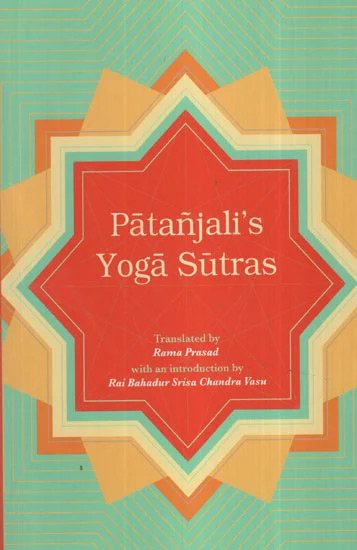Yoga-sutras (with Vyasa and Vachaspati Mishra)
by Rama Prasada | 1924 | 154,800 words | ISBN-10: 9381406863 | ISBN-13: 9789381406861
The Yoga-Sutra 4.25, English translation with Commentaries. The Yoga Sutras are an ancient collection of Sanskrit texts dating from 500 BCE dealing with Yoga and Meditation in four books. It deals with topics such as Samadhi (meditative absorption), Sadhana (Yoga practice), Vibhuti (powers or Siddhis), Kaivaly (isolation) and Moksha (liberation).
Sūtra 4.25
Sanskrit text, Unicode transliteration and English translation of Sūtra 4.25:
विशेषदर्शिन आत्मभावभावनानिवृत्तिः ॥ ४.२५ ॥
viśeṣadarśina ātmabhāvabhāvanānivṛttiḥ || 4.25 ||
viśeṣadarśinaḥ—(darśinaḥ) for the seer (darśin) of the distinction (viśeṣa). ātma—of the self, Bhāva—of the nature and relation of. bhāvanā—of the curiosity, vinivṛttiḥ—the cessation, ceases the curiosity as to the nature and relations of the Self.
25. For the seer of the distinction, ceases the curiosity as to the nature-and-relations of the Self.—185.
The Sankhya-pravachana commentary of Vyasa
[English translation of the 7th century commentary by Vyāsa called the Sāṅkhya-pravacana, Vyāsabhāṣya or Yogabhāṣya]
[Sanskrit text for commentary available]
As the existence of seeds is inferred from blades of grass shooting forth in the rainy season, so it is inferred that he whose tears flow and whose hair stand on end when he hears of the path of liberation, has a store of Karma tending to liberation as the seed of the recognition of the distinction (between the Puruṣa and the Sattva). The curiosity as to the nature for the Self is naturally manifested in him. In the absence thereof, however, he gives up the nature thus described; and by the defect he loves the antithesis and dislikes the thesis.
Here the curiosity as to the nature of the Self appears as—
‘ Who was I ?’ ‘ How was I?’ ‘What is this ?’ ‘How is this ?’
‘What shall we become ?’ ‘ How shall we become ? This however ceases in the case of him who sees the distinction (between the Puruṣa and the mind). Why? This varied change is of the mind alone. The curiosity however in the absence of Nescience is pure, that is, not touched by the characteristics of the mind. For this reason too the curosity as to the nature and relations of Self ceases for the wise.—185.
The Gloss of Vachaspati Mishra
[English translation of the 9th century Tattvavaiśāradī by Vācaspatimiśra]
Having thus described the reasoned philosophy of the Self, which is the very seed of absolute independence, he now shows that the Puruṣa who has reached that stage of fitness is different from any other Puruṣa, who has not reached that stage of fitness. ‘ For the seer of the distinction, ceases the curiosity as to the nature and relations of the Self.’
The curiosity as to the nature of the Self ceases in the case of him who possesses that curiosity, when he sees the distinction between the Subjective Puruṣa and the Objective Existence, by the practice and effective achievement of the means of the Yoga. As to the nihilist who does not possess this curiosity, he is not fit to be taught. There can be teaching in the case of him who has not first ascertained the fact of the existence of the Self in the world outside the present body. He cannot, therefore, come to know the distinction between the two and hence in the case of him there cannot be the possibility of any curiosity ceasing to be.
But the question is. How is the curiosity to know the nature of the Self known to be existing in any mind ? Says he for this reason:—‘ As in the rainy season, &c.’ It is inferred that there exists some Karma done in the previous birth in the shape of the practice of the eight accessories of Yoga or of some portion thereof. Which is the seed out of which is to grow the knowledge of the reality, and which tends towards emancipation. And in the case of such one, the curiosity to know the nature of the Self must necessarily exist without even the necessity of practice.
Shows who has not the capacity, by the authority of the Āgamis [Āgāmis/Āgāmīs?]. ‘ In the absence, &c.’ The antithesis is that there is no fruit of action, there being no entity existing in another sphere of existence, or say there being no other world beyond this. The nihilist is he who likes this view, but does not like the thesis, which has the determination of the twenty-five tattvas in view. The curiosity as to the nature of the Self has been described before. Speaks of the thought of him who sees the distinction :—‘ This varied change, &c.’ The meaning is that the curiosity as to the nature of the Self ceases in tḥe case of him who is wise enough to know the distinction.—25.
